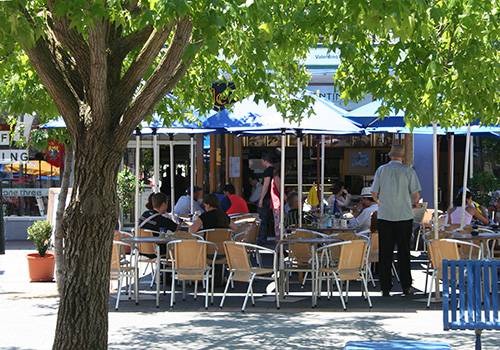Claudia Doman
13 November 2014: How people living in Australian cities are managing the pressures of work, home and community involvement is the focus of a new annual, national wellbeing survey launched by the University of Canberra.
Senior research fellow and project leader Dr Léan O'Brien and colleagues are asking people all over the country to take part in the Urban Wellbeing Survey which will measure the quality of life in Australia's cities.

|
UC researchers will measure the quality of life in Australia's cities through a national survey. Photo: Supplied |
"Australia is one of the world's most urbanised countries and over 75 per cent of Australians live in metropolitan areas," Dr O'Brien said. "We want to know about the cities people live in, so we can find out where things like local amenities, travel and community life are working and where they are not."
The survey is one of two large national surveys conducted by the University of Canberra as part of its 'People and Place in Australia' research program led by Professor Helen Berry.
While the Urban Wellbeing Survey is aimed at big urban centres, the Regional Wellbeing Survey, also seeking new participants, is in its second year of collecting data about the health and welfare of rural and regional communities.
"We want to know more about what makes a great life for everyone, no matter who they are or where they live," Professor Berry said. "What makes a great life in the inner city might be really different from what makes a great life in the bush. So it's important to make sure we listen to everyone," she added.
"There are lots of surveys on health and wellbeing but the Urban Wellbeing Survey is unique because we are looking simultaneously at people's lives at work, at home and in their communities, as well as how easy or hard it is to travel from one to the other, and to the services they need."
"Managing the stress and time pressure of work, home and community can be hard – but not having these things in your life can be hard too," Professor Berry said. "We'll be looking at how people balance work, home and community in cities and what it's like when things aren't going well."
Based on the survey results, the researchers will then publish useful, practical and free information online on the surveyed metropolitan areas next autumn.
Suburbs that complete 100 or more surveys will also be able to get their own local results online, which they will then be able to use to improve their neighbourhoods.
The Urban Wellbeing Survey will be open until midnight 23 November and all eligible participants (18 years old and over) can take part at www.urbanwellbeing.org.au.
Those taking part will enter a draw to win one of 19 prizes including iPad minis and gift cards from Visa, Coles-Myer and Amazon.


